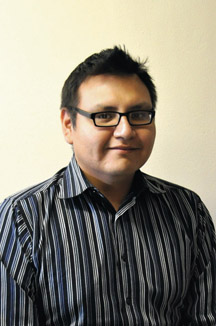 There is a courage to be admired by
There is a courage to be admired by
those who take an action first. The White Earth Band of Ojibwe
recently voted in a constitutional reform effort to effectively
remove its blood quantum requirements for citizenship. Of the Ojibwe
that I have come to know here in Minnesota, there’s been mixed
reaction ranging from hopeful joy about the future to immediate calls
for the dissolution of the tribal government for taking what they
regard as an unwarranted action.
Having covered my own tribal council
for just over two years, it wasn’t a question if – but when – a
tribal citizen or fellow council member would allege constitutional
violations, followed by long executive sessions where the press and
members of the public were required to leave the room for hours at a
time.
It’s tempting to think of a tribal
constitution as holy as stone tablets, etched by God and as wise our
elders. The truth is far less encouraging. In the 1934 Indian
Reorganization Act, tribes that accepted the American-style
democratic model were given a template of a constitution and by-laws,
modeled not on American federalism nor traditional tribal laws and
governments, but on American social organizations that required a
bare minimum of governance. For any high school graduate, reading
through a tribal constitution can be daunting because it soon becomes
clear that the purpose of those documents was to keep us occupied
while real decisions were made about our collective future.
The benefit that tribes like White
Earth have now is that their future is within their own hands. Of
course there will be in-fighting, power-grabs and legal wrangling and
maneuvering, charges of human rights violations and any number of
grievous sins to block the glacially-moving path to progress. It is
the nature of tribal people to debate even as the people debating are
slowly going away, bred out by fallacious arguments on who is and who
is not of the tribe.
Victor Douville, a Lakota Studies
professor at Sinte Gleska University, characterized the nature of
political affiliation within Lakota structures. The historical
structure of most tribal nations was that citizenship was based on a
mutual willingness; a willingness for the whole of the tribe to keep
any individual or family, based on ties, common interests and what
strengths they brought to the tribe and the willingness of the
individual or the family to agree or tolerate the tribe’s priorities
and actions.
In Lakota culture, decisions were
traditionally made through consensus and not a majority rule. When
making an important decision, everyone was heard and all perspectives
were considered. Arguments were made, both pro and con and a decision
was reached. In extreme cases where a significant amount of citizens
could not agree with an action, those individuals or families split
off to join another encampment or began their own.
In modern, Americanized society,
those mechanisms no longer exist. We abide by an elected,
representative government that presupposes we are all strangers and
we submit to that government’s majority rule and stay geographically,
emotionally and psychological static.
So the compromise must be an
absolute willingness to admit that we know nothing. We must let go of
our prejudice and start new, with the idea that our immediate goals
and priorities must both honor our ancestors while providing for our
descendants. In that, we must confront the meaning of what a
constitution for a tribal nation means.
The genius of a constitution is that
it is not set in stone. There are certain principles enshrined in
constitutions, but it is always malleable and changeable because it’s
predicated on the assumption that those who write it are imperfect
human beings with a limited vision of the future. Of those limited
visions, we must confront the concept of blood quantum.
The obsession with blood quantum is
both a healthy and unhealthy one. On the one side of the argument, we
must ensure our blood lines and heritage continue onto the coming
generations; on the other side of it, it’s a false indicator of one’s
cultural competency. Speaking personally, I am a full-blooded Sicangu
with ties to my Oglala relatives in Pine Ridge. Growing up, I heard
the reactionary talk of how “half-breeds” were going to take over
and subjugate the full-bloods and steal needed resources. At its
heart, it’s a very tribal attitude, that the other will consume us
and we will cease to exist, our unique qualities and traditions lost
forever.
But blood quantum isn’t an issue
about how well one keeps cultural competency or even how "Indian"
one conducts oneself. Many full bloods, like myself, have cousins who
are mixed and speak our language and keep our cultural traditions
alive better than I do. Certainly this is not an indicator of
everyone, but it is worth considering when we decide to Other – the
process by which we separate those who do not fit our mold – those
whom we’ve grown up with, shared meals, celebrated and mourned with
throughout our lives.
Blood quantum isn’t responsible for
the loss of culture, blood quantum is the result of a loss of
culture. While we can – and may – delve into issues of sexual
violence and intergenerational and historical trauma and their result
on how each successive generation is conceived; the issue is how
responsible each previous generation is for its children and
grandchildren.
What’s at issue, that no one wants to confront,
is how each nation, tribe, extended family or clan has been unwilling
or unable to keep traditions and culture alive for their descendants.
It’s a very personal experience but one that has to be confronted on
a tribal level. That is not to say we should begin removing tribal
citizens who don’t speak our languages or who practice other
religions before our traditional faiths. But we must always be
mindful that when we choose to paint those whom we disagree with as
less-than, we do damage to ourselves just as well.
The joy to be found in all of this
is that tribes that take the first step in reforming their
constitutions, like White Earth, will have citizens to carry on the
discussion, to carry on the debate and to carry on the decisions that
will impact their descendants






